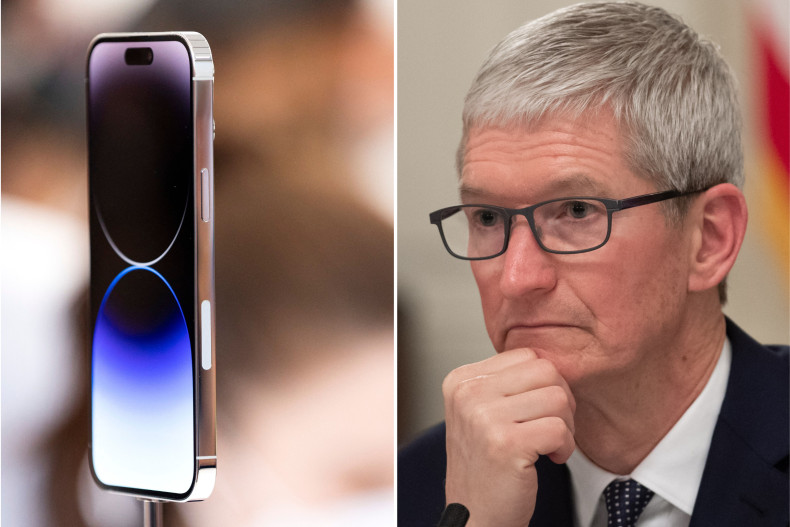OMAR MOHAMMED
 A wrinkle has appeared in Apple's highly anticipated launch of new iPhones next week.
A wrinkle has appeared in Apple's highly anticipated launch of new iPhones next week.On September 12, Apple, the world's largest company by market value, is expected to launch its latest model of the iPhone 15 series of phones.
But the excitement over the launch has been tempered by news reports out of China that authorities have asked employees at state agencies to eschew the use of foreign devices, including iPhones, at work.
The news hit the company's shares and dented its market value by billions of dollars. The company's share price closed down by nearly 3 percent on Thursday, although it looked to be recovering in early Friday trading.
The new iPhone 14 Pro is displayed during a launch event for new products at Apple Park in Cupertino, California, on September 7, 2022. Apple CEO Tim Cook in the State Dining Room of the White House in Washington, D.C., March 6, 2019. China recently banned some of its government employees from carrying iPhones in the office, causing a temporary dip in stock prices.
Some analysts, however, say the impact of the reported ban may be "overblown."
"We believe in a worst-case scenario any China government agency iPhone ban is way overblown as to quantify its less than ~500k iPhones of roughly 45 million we expect to be sold in China over the next 12 months," analysts from Wedbush Securities, an investment firm, wrote in a note shared with Newsweek.
Apple has seen substantial gains in the Chinese smartphone market, the analysts said, gaining about 300 basis points in the last 18 months "with iPhone 15 giving Apple incremental momentum on this front."
Overall, "the iPhone 15 units out of the gates on launch based on Asia checks are in the ~85 million range which is roughly flat with our year-ago number from the iPhone 14 launch," the analysts said.
"We believe bark is way worse than the bite. The shadow ban concerns way less we believe than Street worries," Daniel Ives, managing director and senior equity research analyst at Wedbush Securities, told Newsweek in a follow-up email.
Right now the potential ban is only for state employees and does not appear to extend to the larger consumer class in China.
The iPhone is popular in China, particularly among the high-end consumers, analysts say.
"Historically, the iPhone was more of a status symbol. The latest version, given its price point, is meant for the higher-end consumer market within China," Victoria Hart, a portfolio manager at Pinnacle View Capital Management, told Newsweek. "So the consumer side of it, which probably accounts for a large portion, it may not be impacted that much."
Initial sales of the new products will give an indication of any impact on the company as a result of the potential ban, she said.
"I think the headline news right now is making it sound a little bit more worrisome than I think the financial impact to Apple may turn out," Hart added.
One thing worth keeping an eye on going forward will be whether a change in outlook in the China market develops and turns people to more local alternatives like Huawei, which also launched new smartphones recently that could potentially compete with Apple's iPhones.
"Whether there might be any potential sentiment shifts with regards to being more nationalistic in a consumer's preference may impact the sales," Hart said.
Brandon Nispel, an equity research analyst director at KeyBanc Capital Markets, told Newsweek that in the short term, the potential ban is immaterial. The question is whether in the long-term it sparks Chinese nationalism for alternatives to Apple products and whether the ban goes more broadly to consumers.
"Whether or not these two factors occur really will dictate [Apple's] ability to grow market share in China," Nispel said. "Apple's market share in China is relatively low, 15-20 percent, which is well below more developed democracies like the U.S. and Europe where [Apple's] market share is closer to 50 percent."
Morgan Stanley, in a note shared with Newsweek, suggested that there was a risk perception that "China could potentially be on the path to becoming more nationalistic," a move that would put over $30 billion of operating profit—over 20 percent of the company's total—at risk, should China decide to limit Apple's access to the Chinese market.
"We believe that's an overextrapolation by the market," the analysts wrote.
Doing so carries risks for China too, they argued, as Apple is critical to the country's economy. The company is responsible for millions of jobs "through device production, app development, and has helped build an entire supply chain."
"While the potential for a broad decoupling between Apple and China in this multipolar world clearly exists, we don't believe recent headlines are necessarily foreshadowing this 'worst case' scenario," Morgan Stanley analysts said. "We'd conclude Apple's recent stock move is indeed overdone as it implies Apple loses ~70% of its iPhone shipments in China, a highly draconian and unlikely scenario."
No comments:
Post a Comment